
I am having quite a bit of difficulty writing this piece—and have had that difficulty for the past several years since my identity with my discipline of experimental social psychology became disrupted and unsettled. In my Experimental Social Psychology class I have been sharing with students a case study of the influential career of European social psychologist Diederik Stapel. May I never be so famous that my biography is regularly updated in Wikipedia,
- my story is featured in the New York Times,
- my entire career’s work is evaluated by a Commission,
- I’m featured on a TED train special,
- and my work is regularly condemned on Retraction Watch.
The past few years I have invited my students to share in writing their reactions to this case study. Thank you, Diederik for replying and sharing some of your experiences over the past three years.
I am left struggling with the questions of at what point is ostracism unwarranted and forgiveness or a variant of compassion warranted. At what point does ostracism degenerate into a witch hunt? How can one both acknowledge and condemn wrong behavior (never forget) and yet avoid wrong behavior by failing to allow an individual opportunities to show that they have learned from their misbehavior?
I began my class by having all students carefully read the article Coping with Chaos: How Disordered Contexts Promote Stereotyping and Discrimination. After we have carefully studied the experimental design, elegance of the the thinking, data analysis, conclusions and practical implications I shared with students the reports of the investigation of Stapel’s fraudulent data collection (here is a link) and his explanations of why he falsified data.
The challenge is how to avoid undermining students’ belief in the validity of psychological science while at the same time confronting the reality that science is a human endeavor. I found the Stapel malfeasance most disruptive to my own professional identity (and I am not alone.) How can I make that disruption a positive thing, especially for my students?
I have much to ruminate about: Perfectionism, Fraud, Ostracism, and Forgiveness
Here are some of some thoughts of my students in my Experimental Social Psychology class:
Czarina writes:
My initial response to Diederik Stapel’s situation was shock. While researching in our Social Psychology class we found that he was first accused of fraud in 2011, but by 2016 they had found his 58th retraction. To know that someone of his caliber had committed this much fraud astounded me and after reading the New York Times’ article I found myself asking “why”. Stapel was a respected and well-known researcher and he had worked with many colleges and students. To know that his career was filled with lies and fraud made feel upset. As a result of his crimes, he was stripped of his PhD and was practically banished from the field of psychology. At times I feel as though that wasn’t enough. Stapel used millions of dollars to conduct his falsified studies and to know that money could have been used to conduct other research makes me frustrated. At first, I viewed Stapel as a “villain”. His scandal shook the field of social psychology and made impacts more personal than just that. Many say the reason as to why he was able to forge his work was because of his deep understanding of sociology. He knew what exactly people wanted to see in terms of research and he was clever and knew where to draw his boundaries for how far to push his studies.
It amazes me how one man’s decision can lead to so many consequences. Diederik Stapel’s decision not only impacted himself, but it negatively affected those that he worked with and the students that he took under his wing. Some of his prior students, even feel that due to this scandal their future and careers were ruined. I can’t help but wonder if he thought about not only what this could do to the careers of those he respected, but how this could impact his family as well. The reason I think about this is due to the Netherlands having a very strict culture in which it is not very forgiving. In the article, it said that when apologizing to a past student he felt deep remorse for his actions and when I read that it made me see him as more human than before. Prior to this, I could only see one side of it, but some say that they “blame the system” for Stapel’s actions. Although, I believe every person should be held accountable for their choices, I can see how Stapel might have been blinded by the need for success. In many societies, someone is not worth anything until they prove it, and maybe once Stapel was praised for false research the first time, he found success in that. I can see how the need for success and manipulating studies can become an addiction, similar to gambling. Once you win, you never want to stop, regardless of the consequences.
Although I see this mostly in a negative connotation, I cannot deny the benefits this is created in the field of research. One outcome is that research now needs a lot of supporting evidence and support. Things are being thoroughly reviewed, and many are requiring that studies be replicated. This is only one example, but after listening to my other classmates discuss I cannot deny that this situation has impacted Social Psychology in many beneficial ways. Regardless of the positive outcomes, I still cannot justify Diederik Stapel’s actions, but I do not fully put the blame on his shoulders.
Audrey writes:
Diederik Stapel committed a large amount of fraud, this is an indisputable fact. When I first heard about his situation I wanted to be sympathetic but upon reading further into his story my sympathy waned until all I could feel was disgust. If Diederik had stopped after the first few insistences of fraud that would have been forgivable especially with the justification that he gave for his actions. It’s one thing to succumb to the pressure and impending deadlines of a successful career but to commit such a crime for just ambition and aesthetics is disheartening. The field of science is looked to and respected because it is founded on the belief that the answers that we receive from it are based on observable facts and truths. The scientific method is a key aspect of what gives science the respect it is given, that Stapel claims to love science but committed such large amounts of fraud because the scientific method did not lead to a clear conclusion that supported his hypothesis is just mind-boggling. Blaming the scientific community is easy to do because the field of science does have issues, less now than when Stapel committed his crimes, but at the end of the day,Stapel made the decision to throw away his career. Many have been convinced that their hypotheses were valid and used the scientific method to prove or disprove their hypotheses often learning something else in the process so in my book Stapel does not get a pass just because he didn’t want to spend more time doing research after his first few trials failed. The fact that Stapel got to a point where he was not even attempting to give the experiment a chance to succeed by completing the actual experiments but immediately jumped to faking the data is what makes his actions truly inexcusable and difficult for me to understand, as he has to know that he would be caught eventually and having done the actual research would have cushioned the fall. That he also deprived his student’s and colleagues the opportunity to regain their dignity by redoing the analysis on the raw data and reaching the correct conclusions thus saving their reputations and efforts makes his actions even more reprehensible. Some of my faith in science was shaken when I read that nobody acted on their suspicions, as no one can do so many experiments and get clear-cut answers on or have all their experiments never fail to support their hypotheses without raising some sort of suspicions. However, I am glad that this incident has made the field better and brought much need change to the field of Social Psychology. While I have some sympathy and understanding for Diederik Stapel as he did not know a lot of failure in his life and that by committing fraud he guaranteed that he would never feel failure, I think that he should have been punished more than he was. The Diederik Stapel case has brought to light some of the failures that exist in the field of Science especially social psychology while I am saddened to see such an important figure fall the aftermath of his fall has brought science forward.
Kristen writes:
After reading this interesting New York Times article on Diederik Stapel, I have a different perspective on the field of science in general. This article has shown me that the field of science does not always consist of facts. In the article, it mentions science being the new religion. In the past, religion was thought to be divine and untouchable. If an individual questioned the church, they were seen as crazy. Throughout the years, people have decreased labeling these individuals and started to question some aspects of religion. Today, science is seen in this similar way; being known as factual. However, this scandal has caused me, and many others, to question the validity of scientific research. Thankfully, some scientific journals have resolved this suspicion by having the researchers required to turn in their data with their written piece. Although this feature should have been implemented in the first place, this scandal has shown that science does not always mean truth. It helped us question science, like religion, in how factual this data might be.
When I was first brought into the world of science, I was taught this topic consisted of individuals trying to find the answers to life. Scientists had to conduct experimental or correlational research to find life’s universal truths. However, as I was learning this wonderful field, I never considered the number of resources that were needed in order to conduct these research projects. This leads an individual to become extremely stressed to have perfect results in order for it to be published in a scientific journal. As a college student, I can relate to this strive for perfection in wanting to be admirable for graduate schools. In some ways, this strive for perfection can be beneficial in bringing us to be our best selves; however, in Stapel’s case, it can also cause us to become our worst selves leading to damaging results. I do not condone Stapel’s actions, however, I understand this system is flawed.
Liz writes:
These are my thoughts on Diederik Stapel’s case of falsification in social psychology. Diederik was just like any other experimental psychologist in a growing field; hopeful, bold, and driven. He was driven by success, the amazing feeling of having significant results, and when faced with research that he knew may NOT achieve significant results, he chose to falsify information dozens of times. He described the feeling as a high, hard to stop, similar to when you open the cookie jar and find it impossible to resist. Stapel thought the journals wanted simplicity and results, and he believed “you are what you achieve”. He was obsessed also with order in his everyday life. He seemingly forgot life’s other challenges such as friends and family and became obsessed with work, and it was easy to get caught up in the great results and fame that came with them. When these thoughts are taken into account I am able to begin to understand what went through his mind when this was occurring. When asked on a Ted talk about this incident he seemed to feel badly, and said he contacted those he impacted and many forgave him. Initially in the article it seemed he didn’t feel too badly about their ruined careers.
He, unknowingly, changed social psychology for the better because it was made more fortified, and now researchers are made to submit raw materials and data, not just results. This makes it harder to falsify data. Replication needs to happen more, people often don’t want to replicate because they want their own groundbreaking new study but it is important because some results may be flukes and should be retested. This incident made people realize just because something is published in a scientific journal doesn’t necessarily mean it is 100% correct, which is sad because people trust science and when it is faked it’s a big problem especially for those who don’t trust science (anti- vaxxers, etc). This leads to more distrust and further division of citizens.
Likely why there was little suspicion was because he was considered an “expert” In his field which made people scared to speak out. Unfortunately, misconduct is not as rare as people think, especially back then and likely now as well. He also wrote a book and tried to star in a play shortly after his charges were brought into the open which makes me wonder did/does he really understand the enormity of what he has done to the field of social psychology? He ruined many people’s lives but also spurred a complete overhaul of the way research is handled. His parents blamed the system but he claims to accept blame in the article. He seems to be accepting that he did something majorly wrong and I can kind of understand him when his reasons are stated. I think everyone deserves a second (or 42nd) chance, but time will tell if he really has changed. By now he has had time to reflect on why he actually did this. I wonder if he would be compelled to act the same if he was given the chance to start over.
Caity says:
My thoughts as I was reading various articles pertaining to Diederik Stapel were complex, to say the least. At first, our class read a study that Stapel conducted, and I, along with the entire scientific community for years, found myself overall impressed. That could be an understatement. The research that Stapel sent out into the world was groundbreaking and exciting, exactly what the scientific community hoped for in its research. He cited important people, cited from prestigious journals, and was creative in a thrilling way that seemed to place him constantly on the bleeding edge of scientific discovery. It was clean; it was thorough; it was significant. At one time Stapel was likely one of the most famous researchers operating in Europe. Many people – those who knew him personally, and those who did not – greatly admired him.
But it was always significant. It was always tidy. It was always perfect. Eventually I, like my other classmates and the rest of the world, discovered that Stapel did not actually gather data from his research – rather, he fabricated it all. Such a revelation completely stunned the scientific world. It stunned those working side-by-side with Stapel at Tilburg University where he worked. It shocked his students and complete strangers in the community. Nobody seemed to know how to react at first. For a horror-struck second, the world was still. Then that quickly changed, and the scientific brains of the world altogether seemed to leap up and lash out. It was an affront to the scientific process, that which researchers believed in sometimes more than religion itself. It was personal to many who devoted their lives in the hopes of generating true groundbreaking results, and sometimes to no avail. Suddenly, Diederik Stapel was the perfect villain in the eyes of science.
I, like many others, found myself upset at first. It is easy to be angry, especially when it saves one from thinking. If reality did resemble a fairytale, there is no doubt in my mind that Stapel would be fit into the proper villain role for the sake of story, but real life is hardly ever that simple. The order and perfection that Stapel sought in research through any means necessary drove him to falsify data for his own experiments, for those of his colleagues, and for his students. Stapel acted the way he did for order to beat chaos – a story that always sells. However, he sold the story, among several reasons, to give the scientific community something it desired greatly – hope and excitement. What he ended up giving to the community was order. Order, in this case, came in the form of increased requirements for publication, including a submission of all materials and data.
While it’s easy to be angry, it is important also to recognize that positive effects of Stapel’s actions exist. The scientific community now has a strengthened ability to identify and reject fraudulent research before it can ever reach publication. Individual researchers may turn a sharper eye to their fellow colleagues. Some may even feel a newfound courage to speak out about known manufactured results. In effect, this may make scientific research that one experiences in journals worldwide more trustworthy than they were years ago. While Diederik Stapel himself might not ever receive a thank you for his actions, a thoughtful student would be quite foolish to refuse to learn about the impact Stapel had, particularly on the rules and regulations the research community now has that make it more worthy of the faith millions place upon it every day.
Lindsay writes:
As a college student, I must admit I was frustrated when reading about the drama that shook the psychology field. We depend on research to support our ideas and to challenge what we think we know about the world. It was devastating to read data and to have it seem so possible, only to find out it was one over fifty articles retracted from Diederik Stapel’s collection of research. It was hard to believe that someone could get away with a career’s worth of data and print so many studies without anyone speaking up. After reading about how scared graduate students were to speak up for fear of their careers and education was heartbreaking. I felt for them. We trust that our data is true and that our professors, many of whom are often mentors, are leading us on the path to success. The college student side of me really felt angered and betrayed for the graduate students and coworkers he lied to and to students in the psychology field in general who looked up to him and strived for the kind of career he had built.
However, I have always been a person who tries to imagine both sides. As a college student, I also relate to the stress that comes with making your parents proud and becoming successful. I am competitive, motivated, and hungry to make my small dent on the world. I have had many successes, such as an article publication, good grades, opportunities, and so on. Failure is a hard pill to swallow for me because I have experienced so many opportunities. I understand that he was afraid of failure and disappointing his family. I have experienced failures and even though it was hard, you have to get back up and try again. However, Stapel never had the opportunity to learn to get back up because he never fell. His data always seemed so great and realistic. I understand the pressure to succeed, but his actions go farther than one or two mistakes. He says it became an addiction to conduct fake studies. I still do not fully understand this. He spent so many hours in the library reading research and taking time away from his family to fudge data on research he had never conducted. He could have taken all of the time he used to fake the studies, to actually commit to doing it correctly. He also dragged his graduate students and colleagues into data he knew he would be faking. Was faking data truly worth losing your credibility, friendships, job, and the PhD that you worked so hard for? Maybe in the moment it all seemed so great, but a price was paid.
Lastly, I questioned the process. How could over 50 retractions be submitted, reviewed, and approved in prominent psychology journals? It was alarming to know that so many papers were accepted. It made me question who else was out there submitting data that was faked. For the first time since I entered college, I questioned the information I had become so attached to, the journals I had come to respect, and the daunting process I admired. Was I admiring a broken system and fake data? Was everything I thought I knew false? It could not be that bad, could it? This troubled me deeply. After bringing up the question to Dr. Simpson, some of my faith was restored. We discussed how these retractions changed the way in which journals conducted their process and the information submitted by authors. I now know that it is much more difficult to have data published than ever before due to the problems found in the system.
I am not sure that people will forget one of the biggest events to happen to the experimental social psychology community, however it is time to forgive. While I do not believe Stapel received enough punishment for his actions, I think that the past needs to be closed on this chapter of his life. He may not have paid for his actions with jail time or other severe consequences, but he has lost a lot. I cannot imagine how lonely it must feel to go from having so much support to being publicly shamed. I think it is time that people move on and leave his family alone. While I am not sure he can ever be trusted with a grant or to work for an institution heavily based on research, but I think he is still an educated man who can give something back to the psychology field and make up for some of his actions. As a college student giving perspective on something I can never fully understand, and while not condoning his actions or the punishment he was given, I understand the drive for success and the competition we face to be the best we can be. But you have to look at yourself before judging someone else. I have made mistakes. Does that mean I am unworthy of a second chance? Some people may disagree with me, but I think we need to change our focus to educating younger students about situations like these and supporting them in reporting questionable work they are seeing and making sure that our future researchers are doing the work and not afraid to fail. There is something to be said for those who fall time and time again, but get back up and keep going.
Emily writes: After this year, I will be attending graduate school for School Psychology. In my Experimental Social Psychology class, we were tasked to read an article about a man by the name of Diederik Stapel. While reading, I took a particular interest in the fact that Diederik committed research fraud because he was fixated on order and symmetry. Diederik believed that in order for his research to be published, his results needed to mean something and needed to be significant. He was able to publish around fifty-eight fraudulent articles before two of his graduate students started suspecting something. The two graduate students actually ended up discussing their thoughts with a young professor and that was when everything started to come out. When this came out, I found it interesting that there had been at least two other notable scientists who were found to have forged research as well. I believe that it took so long for Stapel’s error to finally come out because he was a very respected professor and the dean of students at his university. This paired with the fact that he was an award winner of the European Association of Experimental Social Psychology award, made people trust him and respect him. It took Diederik actually going to a school that he supposedly had done research at and him not recognizing any of the buildings on the campus, to actually realize that what he was doing was wrong. After his trip, he confessed to his wife about his wrongdoing and a little while later he was suspended from his job. Since then, Diederik has released a book about his life and what lead him to commit research fraud. He released this book in the hopes that he could raise a profit and earn back some of the respect that he had lost.
Though I think this is a good start, I believe that we as a society need to take a step back from science and reexamine our methods of research. We also need to work on efforts for spotting scientific and research fraud. As for Stapel, I believe that it will take a lot more than a simple apology to regain the trust he has lost and there will always be a reason to weary of what he has to say.
Jordan writes:
As a little introduction, I am a senior psychology and criminal justice double major, I am hoping to get a PsyD. and law degree after I graduate from Carroll. As student researcher here at Carroll as well. I have been doing research both paid and unpaid for the last year with my criminal justice advisor. I have presented at a conference with my advisor and the rest of our team of two other students. I will be continuing to do research this year as a paid assistant until I graduate next fall.
As I was read the article from the New York Times I had many thoughts, feelings, and reactions. As a student and researcher, who has put much of his trust in his advisors, my first reaction was anger, how could a mentor and trusted professor do that to his students? Second was embarrassment, for Staple and for the field in general. It is difficult to study a social science as our field is under constant scrutiny for “not being an actual science” or since replicating studies has been difficult it calls the reliability and validity of social sciences in general but psychology made a big push as to make it a respected science. So in some respects Staple’s actions set the field back. As I read further I had a different reaction, understanding. The article stated that “he love the field of psychology but that get frustrated at the messiness of experimental data, which rarely leads to a clear conclusion”. Having gone through messy data but on a smaller scale, having read many articles that left me with more questions than answers, I empathize with Staple. After that the article says “… science, too, was becoming a business,” he said “There are scarce resources, you need grants, you need money, there is competition””. Again I one-hundred percent agree with Staple on this. I think this to a degree explains his actions, in order to get the money you need to produce results, in order to produce results you need to either get lucky or create the perfect experiment and get the perfect outcome, but the majority of the time you do not get the results you expect or need. People do not want truth, people want results. So money gets pulled, people lose jobs, time feels wasted etc. if you can’t show them results, and that can be terrifying and can cause people to act irrationally and unethically. A bit later the article quotes Staple saying “People think of scientist as monks in the monastery looking out for the truth. People have lost faith in the church, but they haven’t lost faith in science” again to a degree I appreciate Staple’s point. But it takes education and sound judgement to understand science is not infallible. It can be hard for those who do not study or learn about the scientific method to understand that. People think science and/or religion can solve all of their problems and calm their fears when that is not an realistic expectation of anything. A bit later the article says “… individuals were defined by what they accomplished professionally “That’s what my parents’ generation was like”, he said. “You are what you achieve.”” again I think Staple hits the nail on the head. American society functions in a very similar way. You are what you do, you are the list of accomplishments, or titles you can list off. Science works that way as well, as I and Staple mentioned prior, science is the results you get. Your results gain you money and prestige, prestige gains you more money and respect, which gains you further status. I think in the end I can understand and appreciate why Staple did what he did, that doesn’t mean I condone it. With that being said I think humanity today can be way too harsh and unforgiving. I think he has been punished enough by society and himself. I think he deserves the forgiveness of the scientific community. He showed that prior to his actions he was/is a brilliant person. His actions, in the end, also helped the field by making people be more aware and critical of what they are reading, especially those that decide if a study is worthy of publishing by requiring all materials like raw data. Everyone deserves a break and a second chance to prove themselves.
Alex writes:
At first read the Diederik Stapel case made me very upset, I really wanted to know why someone would do what he did. When reading it I had to admit that my first opinion was how could someone be so careless and selfish. Stapel took the lives of his graduate students and his wife and family into his own hands. When falsifying his data, he did not happen to think of the lives of the innocent people he would impact only his own personal gain. Staples only true reasoning for doing what he did was because, he believed the scientific method was messy and it messed for this need for order. While going deeper into the article there were some points that Stapel brought up that I empathize with, life is all about your name and there is a huge pressure in today’s world to be the best at everything you do and do make a way for yourself. After taking a step back it made me realize that Diederik is not the first person to have falsified data and he certainly will not be the last, knowing this fact we know that our system is broken somewhere. That is possible for someone to give fake data and get away with it, 56 times before it is finally noticed.
After thinking greatly about this I believe it is important to hold the people who falsify data to a greater punishment. I do not believe that giving up their PhD is longer enough for people to know that we cannot fake the data of our studies and get away with. This system is broken, and we are very greatly making strides in the right direction that now to publish a study than you must also publish the raw data, but I feel that this is not enough to hold people accountable for their actions. We must make the changes now and they must be greater changes in the efforts to protect the honesty that we have left in the field of Psychology. When data is fake, and studies are called into questioning, it calls into question the field of Psychology as a whole. We must no longer allow people to walk away from their actions and we must hold them accountable for the paths and the actions that they have chosen. We need to help the system, and we need to make sure that we do not allow for people to question the field.
Kelsey writes:
On the first day of class, Dr. Simpson had us read an article that cited a few notable research experiments to defend the idea that chaos promotes discrimination. In this article, the researchers talked about a field study they performed at a train station in Utrecht. While reading this particular experiment, I remember thinking that the way it was set up and the results it produced were very intriguing; it left me wanting more. After our class finished reading and discussing the article, Dr. Simpson presented us with a second article; the New York Times piece on Diederik Stapel.
My first reaction to this story was anger and frustration. I had so many questions racing through my mind: Why did Stapel do this? Why did he not stop? Why did someone not find out about this sooner? I could not believe what I was reading! Dozens of papers that were once considered groundbreaking to the field of psychology are now useless. He harmed and wasted the time of his students, who were living a complete lie without any knowledge of it. Thousands of individuals who looked up to Stapel and his work are now let down because of his lies.
In my time as a student, I have done one research study completely on my own, and I failed to find any significant results. My research took an entire school semester to complete, which lead me to realize that research is tedious, frustrating, and time-consuming. It pains me that Stapel turned this into something laughable and fake. The hard work that researchers put into their designs every day, and Stapel turned it into a joke.
This story not only had me questioning Stapel’s acts, but I could not help but wonder if there are more researchers just like him that have not been caught yet. How many times has this happened in the past? How many times will it happen in the future? As a society, we put so much trust into science, so what are we supposed to believe now? Individuals work hard to destroy the negative criticism and stereotypes that psychology is not a “hard science.” Now, with Stapel’s acts, the critics are able to use a new argument in their favor.
I read the article a second time, hoping that some piece of information would jump out and allow me to forgive him. I have yet to find this, but I was able to feel a slight bit of understanding for what he did. He became caught up in his addiction to praise and fame. Feeling like a superstar on top of the psychological world, he ate up his glory and felt untouchable; until he was finally touched.
Perhaps the way research is conducted needs to change. Maybe each study now needs a supervisor or a team of people to check over the data to ensure its legitimacy. Studies may need to be replicated, not once, but multiple times, to prove that the original results were significant and not faked. Even if all of these methods are implemented, would it be enough to stop someone like Stapel?
Some time has passed since I have read the article, allowing myself time to reflect. I do not forgive Stapel, at least not yet, but I have been able to understand that the feelings of pride and achievement that he experienced allowed him to continue his fraudulent trend. What I will never understand is why he decided to do it in the first place.
Like this:
Like Loading...


















 “Giving Tuesday” is imminent. I can’t escape the reminders. I’ve been asked to be a
“Giving Tuesday” is imminent. I can’t escape the reminders. I’ve been asked to be a 









 Tomorrow I meet with my students for the first time. Even after four decades of teaching I shall be nervous, though for different reasons than my two new colleagues whom I chatted with today (one, a former student!).
Tomorrow I meet with my students for the first time. Even after four decades of teaching I shall be nervous, though for different reasons than my two new colleagues whom I chatted with today (one, a former student!).






 Almost time to leave the new office and drive out to the Graduate Center for another morning of meetings dealing with implementation of Carroll’s new Strategic Plan and contributions the College of Arts and Sciences can make. It is interesting to reflect upon how much of my life has been spent in meetings. In retrospect, was that time well invested?
Almost time to leave the new office and drive out to the Graduate Center for another morning of meetings dealing with implementation of Carroll’s new Strategic Plan and contributions the College of Arts and Sciences can make. It is interesting to reflect upon how much of my life has been spent in meetings. In retrospect, was that time well invested?



 Were I to teach a course on brain health, aging, or brain fitness, I definitely would include Marc E. Agronin’s engaging, thought-provoking, and well-written recent (2018) book The End of Old Age: Living a Longer, More Purposeful Life.He asks three fundamental questions – Why age? (to grow in wisdom). Why survive? (to realize a purpose). Why thrive? (to create something new.) He argues persuasively that aging can and should be seen not as a disease but as a life enhancing opportunity for developing strengths of wisdom, purpose, and creativity. His arguments are well supported both by germane case studies and by detailed chapter end notes. The author makes wonderful and creative use of metaphor and clever turns of phrase, provides useful chapter summaries and even gives the reader an action plan for redefining and “re-aging.” This book definitely deserves careful reading and heeding by readers interested in a balanced, refreshing positive perspective about aging. Below are some resources I plan to further explore gleaned from the book.
Were I to teach a course on brain health, aging, or brain fitness, I definitely would include Marc E. Agronin’s engaging, thought-provoking, and well-written recent (2018) book The End of Old Age: Living a Longer, More Purposeful Life.He asks three fundamental questions – Why age? (to grow in wisdom). Why survive? (to realize a purpose). Why thrive? (to create something new.) He argues persuasively that aging can and should be seen not as a disease but as a life enhancing opportunity for developing strengths of wisdom, purpose, and creativity. His arguments are well supported both by germane case studies and by detailed chapter end notes. The author makes wonderful and creative use of metaphor and clever turns of phrase, provides useful chapter summaries and even gives the reader an action plan for redefining and “re-aging.” This book definitely deserves careful reading and heeding by readers interested in a balanced, refreshing positive perspective about aging. Below are some resources I plan to further explore gleaned from the book.



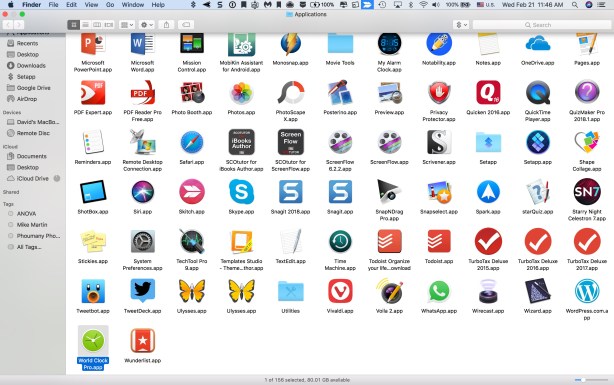


 Tia writes :
Tia writes :

 </li>
</li>











 Thanks for the many lessons you have taught me.
Thanks for the many lessons you have taught me.
























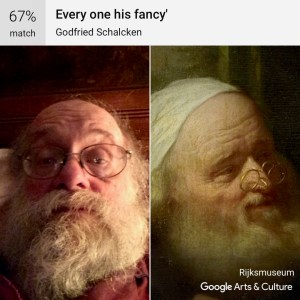






















































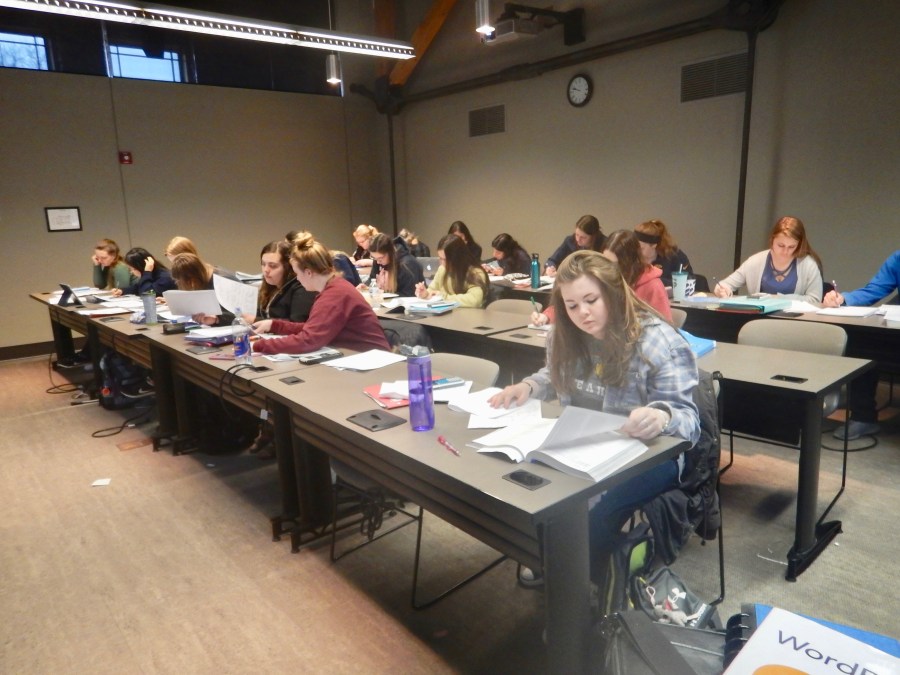


























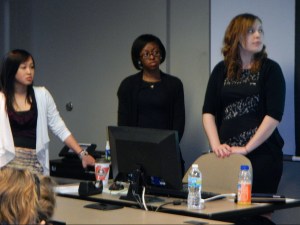












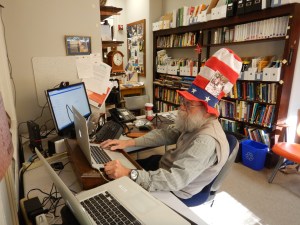























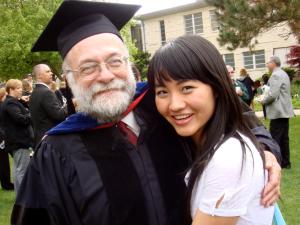















 I enjoy arriving at work by 7:15 am. It gives me time to walk around the Art building to discover the many new student and faculty works of art that are showcased in the different galleries. It will be interesting to see on April 23 the finalized versions of the sculptures which students did (including of your truly!). You can learn more about that project by
I enjoy arriving at work by 7:15 am. It gives me time to walk around the Art building to discover the many new student and faculty works of art that are showcased in the different galleries. It will be interesting to see on April 23 the finalized versions of the sculptures which students did (including of your truly!). You can learn more about that project by 


















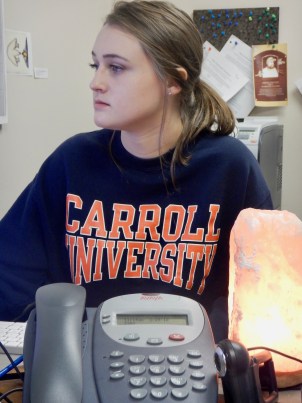







 At Christmas time one of my nephews gave me some brain challenging puzzles. For a few minutes I was able to fool him (and myself!) by being able to solve two of them in a few minutes. Then my beloved, intellectually curious grand nieces and nephews (ages 5 through 8) proceeded to provide a context for my achievements by taking apart the remaining two puzzles which I had recognized as too difficult for me! Alas, they then lost interest and I still haven’t figured out how to put the puzzles back together!
At Christmas time one of my nephews gave me some brain challenging puzzles. For a few minutes I was able to fool him (and myself!) by being able to solve two of them in a few minutes. Then my beloved, intellectually curious grand nieces and nephews (ages 5 through 8) proceeded to provide a context for my achievements by taking apart the remaining two puzzles which I had recognized as too difficult for me! Alas, they then lost interest and I still haven’t figured out how to put the puzzles back together!



























 As I get closer to showing students how to (self) publish a book, I am reviewing resources that I have used in the past. The technology and tools change so quickly. My two “bibles” for the moment (hard copy) are Guy Kawasaki and Shawn Welch’s APE: How to Publish a Book and Chris McMullen’s Volumes 1 and 2 A Detailed Guide to Self-publishing with Amazon and Other Online BookSellers. I have the most experience using Amazon’s CreateSpace software though now and again I am tempted to use Lulu.com –in large part because I have seen what Jane Hart has been able to do with it in publishing her
As I get closer to showing students how to (self) publish a book, I am reviewing resources that I have used in the past. The technology and tools change so quickly. My two “bibles” for the moment (hard copy) are Guy Kawasaki and Shawn Welch’s APE: How to Publish a Book and Chris McMullen’s Volumes 1 and 2 A Detailed Guide to Self-publishing with Amazon and Other Online BookSellers. I have the most experience using Amazon’s CreateSpace software though now and again I am tempted to use Lulu.com –in large part because I have seen what Jane Hart has been able to do with it in publishing her 










 What might prove useful resources to (re)visit as Carroll begins a Strategic Planning Process? Payscale.com’s recent release College/University ROI data base (see below) reminded me of the value of being aware of such resources and of the importance of understanding their value, their assumptions, their limitations, and their potential uses and misuses. Below are a few of my favorite data resources. What have I missed?
What might prove useful resources to (re)visit as Carroll begins a Strategic Planning Process? Payscale.com’s recent release College/University ROI data base (see below) reminded me of the value of being aware of such resources and of the importance of understanding their value, their assumptions, their limitations, and their potential uses and misuses. Below are a few of my favorite data resources. What have I missed?
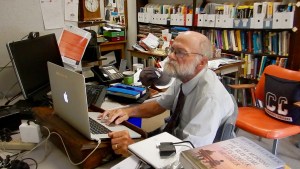







You must be logged in to post a comment.